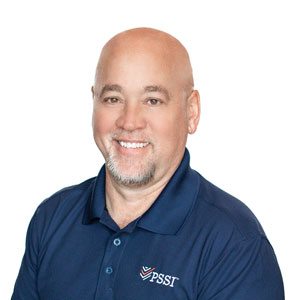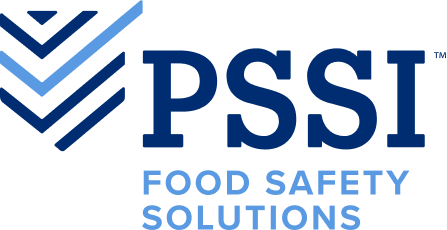
Dan Taft is an experienced food safety expert and the CEO of PSSI. Under his leadership, PSSI has become the leader in contract sanitation and food safety services for food-processing facilities, working with more than 450 facilities throughout North America.
Taft recently responded to questions from PSSI’s customers and addressed some of their most pressing concerns.
1. CORONAVIRUS HAS IMPACTED VIRTUALLY EVERY SECTOR OF THE ECONOMY. HOW HAS COVID-19 IMPACTED THE FOOD PROCESSING INDUSTRY – AND THOSE BUSINESSES THAT SUPPORT THE INDUSTRY?
COVID-19 has created unprecedented challenges for all industries, including food processing and production businesses. At the beginning of the COVID-19 outbreak, consumers quickly purchased essential food items, creating a sudden and large increase in demand for food products from grocery stores. At the same time, many state and city officials announced executive orders to shut down all onsite-dining at restaurants and bars. These separate economic forces caused widespread concern that the coronavirus crisis could threaten the nation’s food production and availability, resulting in higher prices and putting certain items out of reach for low-and-moderate-income communities.
The need to clean and sanitize food processing facilities so that they can remain operational has never been greater. PSSI is committed to helping our customers navigate the challenges of COVID-19 by ensuring their facilities are clean, safe, and optimized to be as productive as possible. In fact, our teams have implemented additional steps – including a COVID-19 decontamination plan – to make certain that the food-processing plants are operating at the highest standard.
2. HOW DO YOU GET RID OF COVID-19? WHAT SPECIFIC MEASURES SHOULD FOOD-PROCESSING PLANTS TAKE TO ENSURE THEIR FACILITIES ARE THOROUGHLY SANITIZED AND THAT THEIR EMPLOYEES ARE NOT EXPOSED TO THE COVID-19 VIRUS.
At PSSI, we firmly believe in the importance of using data and science to guide our response to this pandemic. The EPA has confirmed that there is no evidence of COVID-19 being transmitted through food, however the virus can be transmitted by touching an infected surface and then subsequently touching one’s mouth, nose, or eyes. In fact, the World Health Organization says research has found the virus can live on surfaces for up to a few hours, or even several days.
As COVID-19 quickly spread across the country, PSSI worked closely with our customers to provide critical sanitation services to clean their facilities and to decontaminate them in the case of exposure. To ensure the highest standards of sanitation, and as an added precaution, PSSI has implemented new decontamination processes at all 500 facilities we clean throughout North America.
First, we apply chemical disinfectants as a fog or a mist that is dispersed as an aerosol. This process reduces airborne microorganisms and disinfects surfaces that may otherwise be difficult to reach.
After the initial fog/mist, we conduct PSSI’s 8-Steps of Sanitation. This scientifically verified process is the cornerstone of how we keep plants and products contaminant-free and includes pickup of dry matter, a rinse, hand scrub with detergent, rinse and inspection, cleaning of disassembled equipment, preoperative inspection, sanitization, and then documentation.
Finally, we deep clean all high-touch surfaces on which the virus is most likely to thrive and spread. This step should be continued at least once daily with CDC approved sanitizing supplies and chemicals.
Our team members’ health and safety are always our top priority. To that end, we have implemented extra health and safety measures across our business. Our employees wear protective gear, such as gloves and masks, and those who work in close proximity are encouraged to maintain a distance of at least six feet whenever feasible. Regular and thorough handwashing with soap and water for at least 20 seconds is, of course, the first line of defense, and employees should change gloves when moving from one task to another.
3. WHAT DO YOU THINK WILL BE THE LONG-TERM IMPACT OF THE CORONAVIRUS ON THE FOOD INDUSTRY?
Coronavirus will continue to impact the way we work. For example, some of the new steps we at PSSI have taken to protect our employees – like staggering break times, start times, and end times to prevent congregating – may become a regular part of all workplace operations in the future.
This crisis has also led to increased public interest in America’s supply chains, with the food industry largely in the spotlight. With the world going through a period of introspection, I suspect we will see a shift toward a greater emphasis on self-sufficiency, which will increase the demand on our food processing industry.
4. HOW HAS PSSI HAD TO ALTER THE WAY IT DOES BUSINESS IN LIGHT OF THE CORONAVIRUS?
Sanitation remains the core of our business model. While we were largely prepared to confront the challenges of COVID-19, PSSI has swiftly adapted and modified practices to ensure all facilities are clean and safe, and employees remain protected. For example, we have implemented measures to ensure all adhere to the practices of social distancing – a challenge for many businesses. We now require that all team meetings and daily safety drills take place in areas large enough to allow for six feet of distance between individuals. We are also staggering start times, breaks, and meal periods to reduce the number of employees in a given area. We have provided additional PPE for our team members and have implemented pre-shift temperature taking as a strategy to maintain a safe workplace.
5. WHAT SHOULD A FOOD-PROCESSING FACILITY DO IF AN EMPLOYEE IS FOUND TO HAVE TESTED POSITIVE FOR THE CORONAVIRUS?
Like all crises, planning for every scenario is critical. For example, a customer recently contacted us out of concern that their facility had no plan in place to respond to any COVID-19 issues that might arise. The next day, the customer discovered that an employee had tested positive for the virus and that, prior to testing positive, the employee had worked in various locations throughout the plant.
This company immediately reached out to our operations team, who quickly mapped areas and partnered with the company to formulate a decontamination plan. Based on the information we gathered and other specifics of the situation, PSSI developed a strategy that included fogging with PURE – a misting solution that is 99.99% effective against all types of bacteria, fungi, and viruses – and our 8-Step Sanitation Process. We secured a fogger as well as the correct amounts and types of chemicals needed, and staff were trained to perform the process. We decontaminated the facility in 17 hours and limited downtime.
I think it is important to plan ahead and work in partnership with sanitation services to protect any scenarios that could play out. We know the situation is constantly changing so we have to be ready to adapt and change with it.
